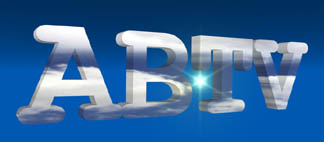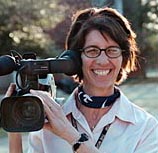It actually was helpful when we broke into small groups and went into "the field" to shoot stories. My group went to the public library to shoot an assignment. The NPPA Workshop license plate credential probably helped convince the parents of toddlers, in the children's room of the library, that we had a valid reason for videotaping there. Other than that, I can't really figure out the purpose for credentials. I've kept some of my good ones for twenty-five years. Maybe, I think that one day the market on eBay for a 1974 Boston Marathon press pass will pay for my kid's education. An Albuquerque Journal photographer told me that one day he will build a house with a bar. The bar will have his lifetime of credentials pressed under glass, and when he drinks and tells war stories and lies, he'll have the souvenirs right there, to jog his memory. Some events spawn a great credentials grab. Perhaps the greatest was the O.J. Simpson trial. Because it went on for so long, and because it caused so many creative people to stay in one place without anything to do, O.J. passes, permits, and heirloom quality IDs were created for everyone. The toughest credential I applied for was News Media ID issued by the Los Angeles Police Department. They take enough information for a major background check, a full set of fingerprints, a letter from your freelance employer, and your baby teeth, if your mother saved them. I'm keeping a baby tooth from each of my children, just in case the LAPD will need them one day. The LAPD press pass is a major credential (wallet size, with a hole for your necklace) and it is recognized by The Secret Service. Where I live, in Albuquerque, the law enforcement agencies do not issue Media IDs. The TV stations issue their own. True to the spirit of the Wild West, some Albuquerque mavericks print their own IDs. I had one issued to myself by myself, but I let it expire, and didn't reapply. A homemade credential doesn't really help weed out the legitimate press from the creeps, but it satisfies the "hunger for authority" in certain security personnel known in England as "jobsworths"--as in: "It's not worth my job to listen to you." When I wear my ABTV media credential, I can tell the jobsworth, "THEY said I should park here." Between THEM and the credential, the combined weight of authority sometimes helps. Well, it's time to tell you the real purpose of the press credential. It was designed the year the President first began traveling by helicopter. "What a good joke it would be," thought someone who worked with the White House Press Corps, "to see if we could strangle all the photographers assigned to the President today, ha-ha!" So they made a press credential for every photographer and newspuke, and put it on a strong key chain necklace. When the helicopter landed, the prop wash blew the credentials around the necks of the working press, and quickly twisted into seven-inch nooses that choked everyone. This was such a source of delight that public relations firms soon caught on. Eventually, everyone, even clerks of the
court, and directors of video workshops, issued credentials--the special
tags attached to a noose for members of the media.
 Amy Bowers
From: "Bob Sherman"
Amy, I read your press credential story with a smile on my face. Reminds my of a snowy night in the early days of tv news back in the late 50's or possibly the early 60's in New York City. A large airliner had just crashed at Kennedy airport and as the report hit the police radios, many of us media folks started skidding our way to it. I had just arrived and gotten out of my car to walk towards the police lines when the bright red news station wagon from WNBC-TV News pulled up to the line driven by Gabe Pressman (a legend in NY TV News.) The car was well marked on all sides & even had some flashing lights on it. A loud exchange took place between a police officer & the driver (Pressman), the cop saying "I don't care who you are, if you don't have a press card you are not going in" and Pressman repeating over & over again "I'm Gabe Pressman with channel 4 news and I forgot my press card." Several times they went back & forth with Pressman not being allowed to move forward. He asked me to vouch for him, which I did, but to no avail. As I was working at the crash site about 20 mins later I heard the following message blair out from all of the police car radios, "Attention all units at the scene of the plane crash, any unit having contact with Gabe Pressman of WNBC shall allow him to enter the scene forthwith, by orders of Deputy Police Commissioner Walter Arm." Yup, Pressman had his desk wake up the Commissioner even at that wee hour. It is always nice to have the proper tools to do the job, even if one of them is called a press card. Bob Sherman
Dear Amy, I read your wonderful column
"I Don't Need No Stinking Press Card" in the latest Digital Journalist
with great enjoyment. Having been a still photographer for Newsday
(Long Island, NY) for forty years I can certainly identify with the strings
of tickets that hang from those dreaded beaded chains that get twisted
around your throat as the assignments drag on.
We had been in Normandy for two weeks before the actual June 5th Celebration, filing stories about the preparations. A couple of days before the big day, we got word that the French Government was closing all of the main roads around the Normandy battlefield area as a test run for June 5th. On that day, the Heads of State from all of the participating Allied Governments would be traveling to and from the festivities at all of the locations that figured so prominently in the invasion. Places like Omaha Beach, Utah Beach, and the various Allied cemeteries where thousands of allied servicemen lay buried. So to test their security arraignments, the French were to conduct dry runs that necessitated the closing of the major roads. Jim Kindall and I had been all through the area for many days, photographing and writing about the famous beaches and small towns that saw the brunt of the massive invasion. We had been staying in Caen, the provincial capitol of Normandy and every day for the past week we had made our first stop the American Cemetery located above Omaha Beach. Located there was the press headquarters for the American media. The US Army would distribute the essential press credentials from a media tent that had been set up. Kindall and I had requested our credentials a year earlier and since most of our coverage on D-Day Plus 50 years would involve President Clinton, we requested White House credentials. We were notified months later, that our credentials were approved. Unfortunately, we weren't actually going to be traveling with Clinton and his press pool, but would arrive in Normandy a couple of weeks ahead of him and his entourage. By the time this was made clear, we had to leave for France and there we were told that we could pick up our press cards at the press tent at the cemetery. Each day we would present ourselves to the media officials, only to be told that the precious tickets had not yet arrived. Finally, we were told that the credentials would arrive the next day. The next day.....the day the French were going to shut down the roads. Kindall and I arose before dawn, hoping to get to the cemetery before the closure. We got close. Oh, maybe ten miles or so, before we ran into our first barricade. Kindall was driving and I was navigating with a map of the French countryside spread across my knees. "Turn right at the next hedgerow and take that dirt road for about three miles. That should take us to another road that'll lead to the main entrance to the cemetery, " I told Kindall. We would take dirt roads and country lanes but always ran into roadblocks, no matter which way we turned. But, gradually we got to within spitting distance of the cemetery where the vaunted White House Press Card awaited us. The card that would allow us to pass through all of these road blocks. Alas, before we were able to reach our sanctuary, we came upon a massive traffic tie-up. Up ahead I could see beleaguered French Gendarmes arguing with truck drivers, cabbies, busses and private vehicles, refusing to let them pass. Many vehicles were making U-Turns and heading back they way they had come. I was frustrated beyond reason. We were so close. I was desperate. I reached into my wallet and extracted my New York City Press Card. It was a very efficient looking document and even had a photograph of me, albeit one that was taken 20 years earlier when I had more hair on my head. I told Kindall to drive our rented Renault on the shoulder of the road and to flash his lights and blow the horn. I leaned out of the window as far as I dared, waving the New York City Press Card and shouted in my best high school French, "Journaliste! Journaliste!" The stunned gendarme waved us right on through. Dick Kraus
From: "Brian G. Wilson"
I cover the White House for
Fox News Channel where you can't MOVE without the proper credentials.
Most of us understand the need for security when you are in proximity to
the leader of the free world. Our pass is thick and contains a microchip
which must be "scanned" before we can enter the White House complex.
Before we are granted a pass, we undergo a fairly exhaustive Secret Service
background check.
They were given to network correspondents and local DC reporters who occasionally needed access to the White House. One day there was a train
wreck north of Washington. The CSX railroad locked everything down
tight before we got there and refused to give anyone access to the accident
scene. One enterprising reporter rolled up in an unmarked news cruiser
bristling with antennae and flashed his White House pass. The rent-a-cop
quizzed him, "PRR, what does that stand for?"
|
